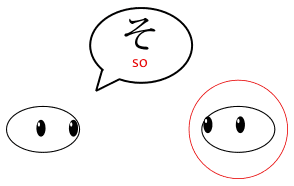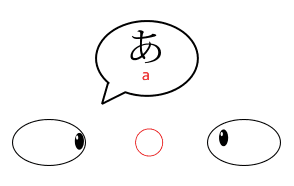Kosoado Kotoba こそあど言葉 - Demonstrative Pronouns
Sunday, October 9, 2016
Have you ever noticed that in anime there are certain similar words like: kore これ, kono この and kokoここ? And sore それ, sono その and sokoそこ? And are あれ, ano あの, and asoko あそこ?! And dore どれ?, dono どの and doko どこ?!?! No, it's not a coincidence! These are the kosoado kotoba こそあど言葉, the Japanese demonstrative pronouns!
Basically, you can group these "kosoado words" by what they refer like this:
As you can see, the part that comes after the ko-so-a-do prefixes is what determines the type of the pronoun. The ko-so-a-do prefixes themselves stay the same, having more or less the same meaning regardless of the rest of the word. Their meanings refer to:
These words are often translated as "what," "what X," "which," "where," etc. So their most common use is in asking questions about things, however, they can also be used to say "whatever," "whichever, "wherever," and so on when used together with certain grammatical particles when the point of the phrase is to not specify a certain thing but, instead, talk about all of them at once.
Basically, you can group these "kosoado words" by what they refer like this:
- kore, sore, are, dore これ、それ、あれ、どれ
Abstract idea. - kono, sono, ano, dono この、その、あの、どの
Given attribute. - koko, soko, asoko, doko ここ、そこ、あそこ、どこ
Place, spot or location. - kou, sou, aa, dou こう、そう、ああ、どう
Manner of action. - konna, sonna, anna, donna こんな、そんな、あんな、どんな
Likeliness. - koitsu, soitsu, aitsu, doitsu こいつ、そいつ、あいつ、どいつ
Individual person, individual thing or individual item. - konata, sonata, anata, donata こなた、そなた、あなた、どなた
Person or side of the conversation. - kochira, sochira, achira, dochira, こちら、そちら、あちら、どちら
Side or direction. (formal) - kocchi, socchi, acchi, docchi こっち、そっち、あっち、どっち
Side or direction. (casual)
(the links above lead to articles explaining each of them, how they're used and usage examples)
As you can see, the part that comes after the ko-so-a-do prefixes is what determines the type of the pronoun. The ko-so-a-do prefixes themselves stay the same, having more or less the same meaning regardless of the rest of the word. Their meanings refer to:
- Prefix ko こ
This.
Something close to the speaker. - Prefix so そ
That.
Something close to the listener. - Prefix a あ
That over there.
Something far from both, but that can be seen or understood. - Prefix do ど
What?
Something the speaker doesn't see or know about.
Ko こ
The pronouns starting with ko こ, kore, kono, koko, kou, konna, koitsu, konata, kochira, kocchi これ、この、ここ、こう、こんな、こいつ、こなた、こちら、こっち, are all about the speaker, that is, the guy who's speaking, talking at the moment.
Many of those words are often translated as "this," or "this X," or "here," etc. They refer to something the speaker is holding right now, on his close surroundings, on his side, or something he has done or mentioned recently.
Usage Examples
- kore wa omoshiroi これは面白い
This is interesting! - kono keeki ga hoshii このケーキが欲しい
I want this cake. (not the other cakes, this one) - koko wa watashi no ie desu ここは私の家です
My house is here. - naze kou natteshimatta!? なぜこうなってしまった!?
Why did it end up like this!? - konna omoshiroi manga ga aru nante, shiranakatta こんな面白い漫画があるなんて、知らなかった
That a manga as interesting as this existed, I didn't know! - koitsu wa odoroita! こいつは驚いた!
I was surprised about this one! - kochira e douzo こちらへどうぞ
Come here.
So そ
The pronouns starting with so そ, sore, sono, soko, sou, sonna, soitsu, sonata, sochira, socchi それ、その、そこ、そう、そんな、そいつ、そなた、そちら、そっち, are all about the listener, that is, the guy whom the speaker is speaking to.Many of those words are often translated as "that," "that X," or "there." They refer to something which the listener is holding, something close to him, the physical space surrounding him, his side, his direction, something he has done or mentioned recently, etc.
Usage Examples
- sore wa taberundesuka? それは食べるんですか?
Are you gonna eat that? - sono tame ni nandemo shimasu そのために何でもします
For that purpose (which you've mentioned just before) I'll do anything. - soko wa heiki ka? そこは平気か?
Is everything alright there? - sou omou そう思う
I think the same was you. - sonna ni muzukashii desu ka? そんなに難しいですか?
Is it that much difficult? (as you said) - soitsu wa ningen da そういつは人間だ
That one is human. - sochira wa dou desu ka? そちらはどうですか?
How are things there?
A あ
The pronouns starting with a あ, are, ano, asoko, aa, anna, aitsu, anata, achira, acchi あれ、あの、あそこ、ああ、あんな、あいつ、あなた、あちら、あっち are a little tricky. They are about things which are far from both speaker and listener.
These words are also often translated as "that," "that X" and "there" because English doesn't have a third demonstrative pronoun specific for this situation. Actually, it's the so そ pronouns which are the problem, being specific to the listener. In English, "this" is about the speaker, and "that" about the rest. The pronoun a あ is about the rest in Japanese.
Basically, anything that you can refer to, you can see, point, mention, or think about, but you can't use neither ko こ nor so そ because it's not something the speaker or listener have next to them, are holding, etc. and did not do or mention recently, ends up having to be referred to using a あ pronouns simply because ko こ and so そ aren't applicable.
Usage Examples
- are wa akuma ka? あれは悪魔か?
Is that (over there, far from us) a demon? - ano ken wa dou narimashita ka? あの件はどうなりましたか?
What became of that matter? - asoko wa tashika ni kowai あそこは確かに怖い
There is indeed scary. - min'na aa desu ka? みんなああですか?
Is everyone that way? - anna yatsu ni makenai yo! あんなヤツに負けないよ!
I won't lose to someone such as that! - aitsu wa ii yatsu da あいつはいいやつだ
He's a good guy. (that guy is a good guy, she's a good guy, etc.) - achira wa watashi no tomodachi desu あちらは私の友達です
Those are my friends.
Do ど
The pronouns starting with do あ, dore, dono, doko, dou, donna, doitsu, donata, dochira, docchi どれ、どの、どそこ、どあ、どんな、どいつ、どなた、どちら、どっち are interrogative pronouns and are used to refer to something which is not known or is not specific.These words are often translated as "what," "what X," "which," "where," etc. So their most common use is in asking questions about things, however, they can also be used to say "whatever," "whichever, "wherever," and so on when used together with certain grammatical particles when the point of the phrase is to not specify a certain thing but, instead, talk about all of them at once.
Usage Examples
- dore kurai ga kakaru no deshou ka? どれくらいがかかるのでしょうか?
How much is it going to cost? - dono manga ga suki desu ka? どの漫画が好きですか?
Which manga do you like? - okaasan wa doko desu ka? お母さんはどこですか
Where's your mother? - dou yatte katsu? どうやって勝つ?
How to win? - donna shokugyou ga aru no ka? どんな職業があるのか?
What kind of jobs are there? - doitsu どいつ?
Which? Who? - okane to shiawase dochira ga hoshii desu ka? お金と幸せどちらが欲しいですか?
Money or happiness, which do you want?
Do... demo ii
Another interesting note about the kosoado kotoba is that, no matter what kind of pronoun, the structure do...demo ii always has the same meaning. Look:
- dore demo ii どれでもいい
It doesn't matter what. - docchi demo ii どっちでもいい
It doesn't matter which. - dou demo ii どうでもいい
It doesn't matter how. - doko demo ii どこでもいい
It doesn't matter where.
This structure can also be used with other interrogative pronouns too.
- dare demo ii だれでもいい
It doesn't matter who.




